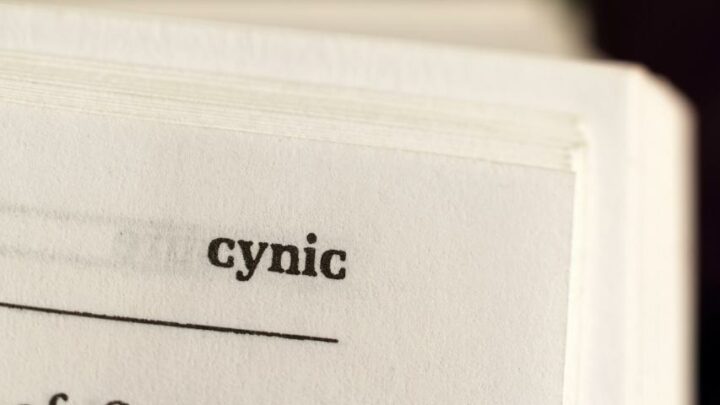Some common English words and phrases only make sense after you study their origin.
On the other hand, language also changes over time and words often don’t carry their original meaning.
You don’t need to read Nietzsche to stare into the abyss, after all.
The best approach is simply to understand how people today use words. “Cynic” is a great example.
How to use “cynic” in a sentence
The word “cynic” is a noun that describes a person who has a perpetually skeptical or pessimistic nature. The easiest way to use the word in a sentence is to say somebody “is a cynic.” You can also use “cynic” as the subject or object of a sentence.
The meaning of “cynic” in English
What exactly is a cynic?
In modern usage, the word “cynic” means that someone is skeptical of others.
A person who continually says a good friend will betray you could be called a cynic. So might someone who scornfully denies that someone has good intentions.
You can also call someone a cynic if they’re jaded and have too much experience to find things new and exciting anymore.
In short, a cynic is a person who thinks that the world is a place where only bad things happen.
Calling someone a cynic directly
The easiest way to use the word “cynic” in a sentence is to just call somebody a cynic.
To do this, you’ll need to put “cynic” at the end of a sentence or clause and link it to the subject with a version of the word “is” and the word “a.” (If you’re interested in grammatical terms, “is” is a linking verb and “a” is the indefinite article.)
Do you need a comma after cynic? It’s a good question, but unfortunately the answer is “it depends.”
If “cynic” is at the end of one clause instead of the whole sentence, you may need a comma but that isn’t always true.
Check our article about clauses vs phrases for some pointers.
Example Sentences using “cynic”
This is perhaps the simplest way to use “cynic” in a sentence. It comes at the end of the sentence, so no commas are needed.
Instead, it simply connects to the subject of the sentence (“Bob”) with the linking verb (“is”) and indefinite article (“a”).
Of course, in many cases sentences aren’t this simple.
In this case, “cynic” is describing Shigeru.
The sentence still has a linking verb and indefinite article but there’s also an adverb (“such”) implying the degree of cynicism and a second clause (“people stopped talking to him”) connected to our main clause (“Shigeru was such a cynic”) with the word “that.”
In this particular case, there’s no need for a comma.
Using “cynic” as the subject or object of a sentence
It’s also possible to use “cynic” by making it the subject or object of the sentence.
In this case, you don’t need to worry about linking verbs, although you will still need to use an article like “the” or “a.”
The short version is that “the cynic” or “a cynic” becomes a noun phrase that can be inserted in a sentence anywhere someone’s name could be.
There are no grammar rules to remember here beyond the other ones that go into making sentences.
Example Sentences using “cynic” as the subject or object of a sentence
“The cynic got the shock of her life when a stranger gave her the winning lottery ticket.”
Here, “the cynic” could easily be somebody’s name. However, because we want to draw attention to how cynical the person is, we’re using “cynic” to describe her instead.
In this sentence, “the cynic” is a noun phrase and the subject of the sentence.
Here, “the cynic” is in the object position. Note how this is very similar to the grammar involved when directly calling someone a cynic.
The words “cynicism” and “cynical”
This article uses several words related to “cynic.” Specifically, those are the words “cynical” and “cynicism.”
These words carry basically the same meaning, but they’re different parts of speech.
The word “cynical” is the adjective form of “cynic” and is used to describe actions or beliefs that a cynic takes or holds.
The word “cynicism” is the noun form of “cynical,” and refers to a pattern of cynical actions or beliefs.
Bonus: the origin of “cynic”
Although knowing the origin of words doesn’t always help you learn how to use them, they’re often interesting.
For example, knowing whether you’re wearing slacks, pants, or trousers is different from knowing where each word originates, but learning that is fascinating too!
For “cynic,” there is actually a big difference in the current and historical meaning.
Originally, the word “cynic” referred to a specific school of Classical Greek philosophy, cynicism.
The Greek cynics believed that people could achieve happiness by rigorously controlling what they did and avoiding “unnatural” things like wealth, fame, and societal conventions.
It’s a pretty big jump from that to someone who’s just skeptical. If it helps, you can think of the original cynics as people who were skeptical about what society thought they should do and had their own ideas.
In general, though, you don’t need to know about the Greek cynics to use the word “cynic” in a sentence.

Hey fellow Linguaholics! It’s me, Marcel. I am the proud owner of linguaholic.com. Languages have always been my passion and I have studied Linguistics, Computational Linguistics and Sinology at the University of Zurich. It is my utmost pleasure to share with all of you guys what I know about languages and linguistics in general.

